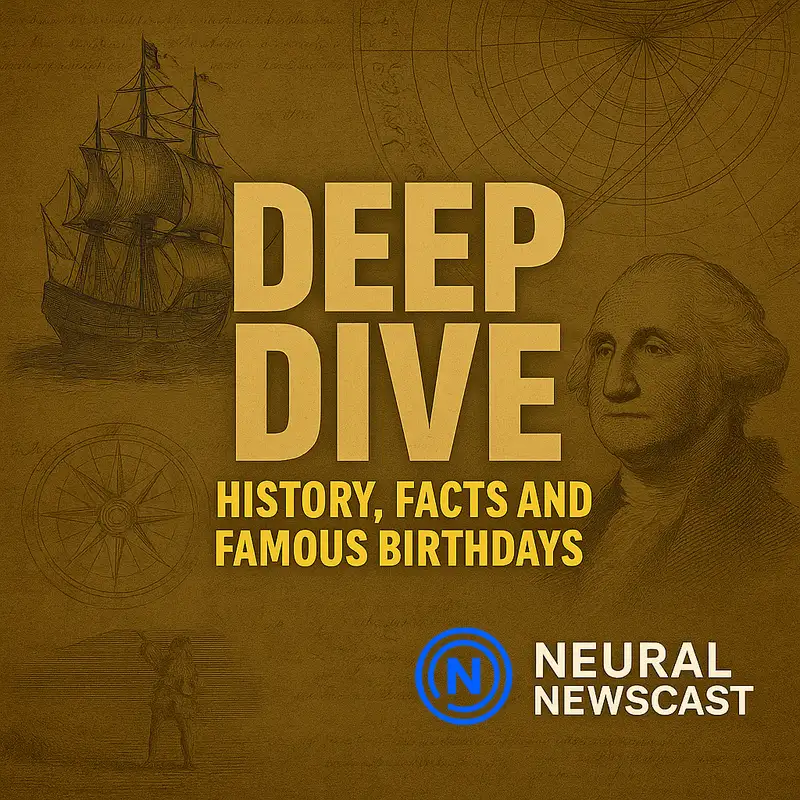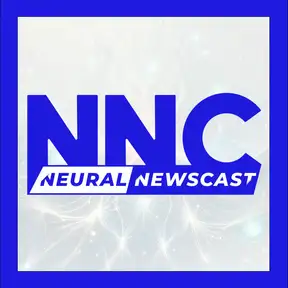Deep Dive: Jonestown's Legacy, Johnny Mercer’s Craft, and a Typing Trivia Twist - November 18, 2025
AI delivers it fast. Humans ensure it's right.
This is Neural Newscast.
Thanks for joining us for this Neural Newscast deep dive.
I'm Leela, your arts correspondent, and alongside Sophia, our weather reporter, we're about
to uncover some intriguing stories.
On this day in 1978, over 900 members of the People's Temple cult died in a mass murder
suicide in Jonestown, Guyana, led by Jim Jones, marking one of the largest such tragedies
in modern history and sparking global discussions on cult dangers.
Hearing that line always tightens the chest.
Over 900 lives lost in Jonestown under Jim Jones' leadership is a grim anchor for how we talk about coercion and group dynamics.
As someone who looks at cultural movements, that event reframes how we interpret charismatic authority in art and community.
How devotion can become something dangerous when it silences dissent.
And from a scientific investigative angle, it's a case study in how environmental and social isolation can amplify control, producing catastrophic outcomes.
The Jonestown tragedy forced changes in how authorities and the public understand such groups.
It also altered storytelling about faith and utopia in popular culture.
Jonestown became shorthand for the dark side of idealism,
a touchstone that artists and writers return to
when exploring manipulation and hope gone wrong.
In practice, the aftermath reshaped how mental health professionals,
law enforcement, and policymakers think about prevention and intervention.
Those conversations ripple into galleries, theaters, and literature.
Every depiction of community now carries the memory of Jonestown's scale and the way it exposed vulnerabilities and communal belonging.
And climate or weather metaphors aside, the event forced a clearer public language about risk, recruitment, and control, helping communities recognize warning signs earlier.
That clarity matters because remembering Jonestown isn't only about the horror, it's about honoring those lives by shaping cultural and institutional safeguards.
Exactly.
Keeping the specifics sharp, Guyana 1978, Jim Jones, more than 900 dead, helps keep the lessons focused and actionable.
The artistic impulse then is to keep probing that history, not to sensationalize, but to interrogate the social textures that allowed such a tragedy to unfold.
And the meteorologist in me insists on precision, clear, verified context, prevents mythologizing and keeps us learning from the evidence.
.
Time for a quick pause. We'll explore more when Neural Newscast Deep Dive returns.
Shifting gears, we celebrate the birthdays of Johnny Mercer , Alan Shepard ,
and Margaret Atwood .
Johnny Mercer stands out to you as the one we should dig into today?
Yes. Let's linger on Mercer.
As a songwriter and lyricist born in 1909,
his hand in tunes like Moon River and Hooray for Hollywood
really maps onto American culture in a way that's both charming and complex.
He wrote Moon River, right?
That song keeps popping up in films and covers.
It's like a persistent weather pattern you can never quite shape.
Exactly, and that persistence is part of the point.
His melodies have this way of threading personal longing into broad cultural moments,
so a simple melody becomes a shared memory.
Mercer could make an intimate lyric feel universal without losing its specificity.
There's an almost technical clarity to that.
How he shaped syllables and cadence so a line lands perfectly in a singer's mouth,
meteorologically speaking.
High pressure, then a soft front, then release.
I love that image.
He fused craft and heart,
The lyrics are meticulously tuned but they breathe.
Hooray for Hollywood!
Meanwhile, captures an era's gleam and irony at once.
Celebration with a wink.
It's interesting how songs like those help us read cultural climate.
What a society valued, hoped for, even worried about.
Mercer's work becomes a primary source for the mood of the 20th century.
And beyond the hits, there's a lesser-known truth.
His collaborations and ability to move between writers and performers made him a connective tissue in the industry.
He wasn't just writing tunes, he was shaping the networks that carried them.
Right. He helped set the trajectories for how songs circulated, radio, film, live performance.
So his influence is structural, not just melodic.
Precisely. That structural influence is why his legacy persists.
It's woven into the ways we present and preserve music.
Artists today still draw from his blend of lyricism and narrative economy.
So his lasting relevance is twofold.
Songs that stay on the air and a model for how a songwriter can operate within cultural systems.
Yes, and when we revisit his work, we hear more than nostalgia.
We hear craft that taught later generations how to make songs that matter both intimately and publicly.
Makes you appreciate the longevity of well-crafted art, kind of like long-term climate signals versus a passing storm.
And that's why celebrating Mercer today feels necessary.
His melodies continue to shape our emotional landscape,
and his methods still teach artists how to speak to a broader audience without losing nuance.
Absolutely. His legacy is audible history, and it's still influencing new creative currents.
Listening to Mercer Now, you can trace the line from a single lyric to cultural resonance.
And that's a reminder of why songwriting is such a powerful art form.
We'll be right back after this short break.
Stay tuned to NNC for Unbiased Daily News Summaries.
Subscribe and explore our archives at nnewscast.com.
This is Neural Newscast.
Thanks for staying with us on Neural Newscast Deep Dive.
Let's get back to our discussion with the fact of the day.
Stewardesses is the longest word that is typed with only the left hand.
That's a neat little linguistic weather vane.
On a standard QWERTY keyboard, it uses only the left hand.
The rhythm of that word feels almost performative, doesn't it?
A rolling cluster of consonants and sibilants,
and yet it's anchored by that exact typing quirk.
Exactly. It's the kind of precise observation I love, how our bodies interact with language through the keyboard.
Saying it aloud, you can imagine the left hand moving across the keyboard like a conductor's baton,
which somehow makes the fact feel theatrical.
And from a practical angle, the entire word sits on the left side of a chordy layout,
so the coordination is purely unilateral.
That unilateral motion has a certain poetic symmetry.
The word itself becomes a small performance piece entirely handled by one hand.
It also subtly highlights design choices in the Quarty layout.
showing how keyboard geography produces these little curiosities.
The fact reads like an art house detail in a larger cultural narrative,
a tiny specific truth that opens up a way to notice the everyday.
And it's precise and repeatable, a fact you can test if you want to feel the motion yourself.
I love that it invites you to try it, to feel the choreography,
and maybe appreciate how even our tools shape language in subtle ways.
simple, verifiable, and oddly delightful.
That's all for this Neural Newscast deep dive.
On behalf of Lila and myself, Sophia, thanks for listening.
You have been listening to NNC.
Visit nnewscast.com for more episodes and deep dives.
Neural Newscast combines real voice recordings with synthesized voices
to enable prompt production without sacrificing quality.
All content is generated using advanced AI algorithms developed by a human
and undergoes fact-checking and human review prior to release.
While we strive for factual, non-biased reporting
and actively work to prevent AI hallucinations,
AI-generated content can occasionally contain errors.
Listeners are encouraged to verify critical information from trusted sources.
For more details on our AI transparency policies,
visit nnewscast.com.
Creators and Guests


